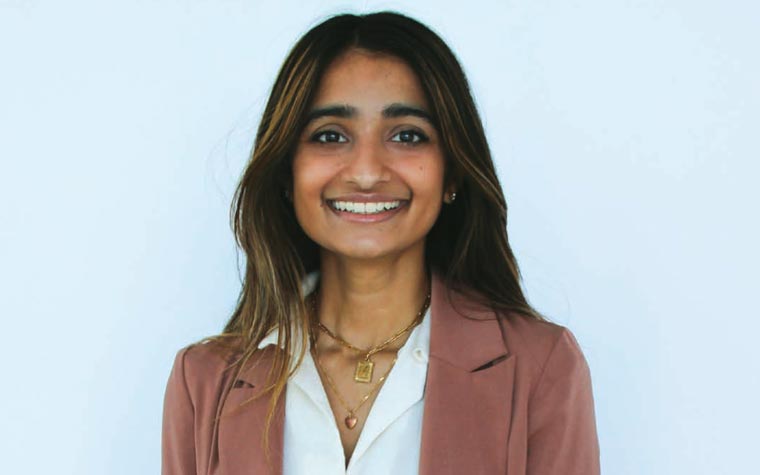Once an outsider, environmentalist Manvi Bhalla is now at the center of a movement
Manvi Bhalla, a Canadian environmental youth advocate, is a force to reckon with when it comes to bringing awareness and accountability to the climate crisis. At only 23 years old, she has made it onto Corporate Knights magazine’s 2020 class of its Top 30 Under 30 sustainability leaders in Canada, and was also named one of the Top 25 Environmentalists Under 25 by environmental advocacy group The Starfish Canada the same year.
“One of my big worries is that the people currently in the positions of power do not represent the people who will be most impacted by climate change,” says Bhalla.
The activist is most passionate about using her voice to represent underserved communities and takes an intersectional approach to address the inequities in health and the environment. Being a woman of color who has been diagnosed with ADHD in adulthood, she hopes that by sharing her own identities, she will be able to best represent others like herself.
Despite speaking about the big issues in her academic and personal life, Bhalla keeps a recent conversation lighthearted and fast-paced. Born in India, Bhalla immigrated to Canada with her family when she was three years old; they settled in the Thorncliffe Park area in East Toronto.
“I always reflect upon my time living there when we first arrived,” she admits. “We didn’t have any money.”
Bhalla’s parents are both dentists who trained in India but needed to go back to school to earn their Canadian dental degrees. When they eventually began working in their field, the family moved into higher socioeconomic areas, which were predominantly white, and ended up settling in Hamilton, Ontario, where her parents set up a dental practice.
Bhalla’s introduction to activism occurred when she was 11 years old; she won an award for her social documentary on global food insecurity. As she grew up, she started embracing different fields of social justice. In high school, after learning about American civil rights advocate Kimberlé Crenshaw’s theory of intersectionality, Bhalla’s focus shifted to intersectional feminism. She also became the president and chief financial officer of Oxfam’s chapter in Guelph, Ontario, while she attended the University of Guelph. But it wasn’t until her second year of studies that she started to get interested in climate change.
“Everyone I met at university seemed to be a climate change activist,” she says, laughing. “And then I took it on. When I get interested in something, I go full out.”

Bhalla with Shake Up The Establishment co-founder Janaya Campbell

Bhallah with missINFORMED co-founder Clara MacKinnon
From a student to a co-founder of two national nonprofits, it’s not surprising that Bhalla describes herself as being a very “interdisciplinary person.” Within a short time, she co-founded missINFORMED, an organization aimed at improving the health of women and gender-diverse individuals, while her other nonprofit, Shake Up The Establishment (SUTE), is a youth-led, nonpartisan resource hub for Canadian climate policies.
SUTE took off when it was first launched as a website prior to the 2019 Canadian federal election. The preliminary idea for it began after conversations with friends who, like Bhalla, were very confused by the different party stances on climate change. Together, they developed SUTE, a website that included short, evidence-informed, scientifically backed, fully cited research. The response was overwhelming and, in February 2020, SUTE was incorporated as a nonprofit organization. Bhalla’s mother sits on the board as director and treasurer, helping navigate the processes needed to run a nonprofit.
In addition to completing her Master of Science degree at the University of Waterloo’s School of Public Health and Health Systems, Bhalla’s extracurricular commitments grew to encompass becoming the steering committee chair of the ENRICH (Environmental Noxiousness, Racial Inequities, and Community Health) Project (via MakeWay) led by Dr. Ingrid Waldron, a mentor of Bhalla’s, who is well known for having been instrumental in helping develop Bill C-230, a “National Strategy to Redress Environmental Racism Act.” Bhalla was also the graduate president of the University of Waterloo’s student arm of the Interdisciplinary Centre on Climate Change. This fall, Bhalla will be pursuing a Ph.D. at the University of British Columbia’s Institute for Resources, Environment and Sustainability, with a focus on Law, Governance, Justice & Policy.
Most recently, and as a result of the COVID-19 pandemic, Bhalla has been a lead research assistant for several national studies that are funded by the Canadian Institutes of Health Research. They focus on the sociocultural and behavioral factors affecting certain communities, particularly young adult populations across the provinces. One of the studies Bhalla directs explores the South Asian populations in Ontario, who have been among the hardest hit by the pandemic.
“It’s gut-wrenching to hear from peers who are having a very hard time,” Bhalla says, empathizing with the studies’ subjects.
She has been managing her own challenges during the last few years. In addition to being diagnosed with ADHD, she also copes with generalized anxiety and depression.
“It’s difficult to juggle all these things, but in a way, it forces me to stop and take inventory and take care of myself so that I can, in turn, take care of others,” she says thoughtfully.

Bhalla’s parents, Dr. Komil Bhalla and Dr. Jasdev Bhalla.
Taking care of others is first and foremost for Bhalla. She jokes about not having time for a part- ner but is proud of the relationships she’s nurtured with her friends, family, and colleagues. And when she needs a “reset,” she fosters dogs in her spare time. Her own dog, Potato, is a rescue.
Bhalla views sustainability, climate, and the environment through an intersectional lens, acknowledging that climate change will affect underserved communities more severely.
“The threat is still the threat, but the way we approach climate change matters. With an intersectional approach, we can save lives in a distributive justice manner,” she says.
She sees the actual ability to care about climate change as a kind of privilege, pointing out how there are many people who care about the environment because they can and there are others who are just trying to live day by day.
Looking ahead, Bhalla envisions a life in academia.
“I want to do research that’s meaningful and addresses topics that are underrepresented,” she says. “At the core of everything I do is my desire to move the agenda forward for people who haven’t always had
a voice in Canada. You’re leaving people behind if you’re not being intersectional.”
With dreams of helping people in the future, Bhalla will continue to help people in the present.
This article by Rena Godfrey appeared in the Fall 2021 issue of Lifestyles Magazine.
Photos: Clara MacKinnon, Gregory Mallet, Benjamin Rudolph and Manvi Bhalla.
